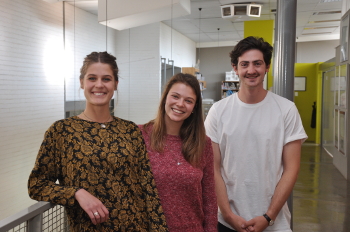Latest News Archive
Please select Category, Year, and then Month to display items
12 October 2020
|
Story Arina Engelbrecht
|
Photo Supplied
 Arina Engelbrecht from Organisational Development and Employee Well-being believes physical activity has a number of benefits for one’s health, including stress relief.
Arina Engelbrecht from Organisational Development and Employee Well-being believes physical activity has a number of benefits for one’s health, including stress relief.
Being physically active plays a big role in preventing the development of mental-health problems and in improving the quality of life of people experiencing mental-health problems.
Treatment for depression
Physical activity can be an alternative treatment for depression. It can be used as a stand-alone treatment or in combination with medication and/or psychological therapy. It promotes all kinds of changes in the brain, including neural growth, reduced inflammation, and new activity patterns are formed that promote feelings of calm and well-being. It releases endorphins – powerful chemicals in the brain that energise your spirit and make you feel good.
Physical activity can be very effective in relieving stress. Research in adults has found that physically active individuals tend to have lower stress levels compared to individuals who are less active. It also leads to improved sleep. When a person sleeps better and feels more rested, overall quality of life improves. They cope better with daily life stressors.
Reduce Alzheimer's risk
Regular physical activity can reduce your risk of developing Alzheimer's disease by up to 50%. It can also slow down further deterioration in those who have already started to develop cognitive problems. It stimulates the brain’s ability to maintain old connections as well as to make new ones.
A study asked people to rate their mood immediately after periods of physical activity (e.g. going for a walk/run, cycling, doing housework) and periods of inactivity (e.g. reading a book or watching television). Researchers found that participants felt more content, more awake, and calmer after being physically active compared to after periods of inactivity.
In conclusion, people who are physically active feel a sense of well-being, feel more energetic throughout the day, sleep better at night, have sharper memories, and feel more relaxed and positive about themselves and their lives.
“Being physically active not only changes your body, it changes your mind,
attitude, and your mood.” – Arina Engelbrecht
Department of Architecture creates environment for winners
2017-08-29

The three beneficiaries of the Carl and Emily Fuchs
Foundation’s Prestige Prize in Architecture were from
the left: Madeli Beyers (UFS), Diana Kuhn (UCT),
and Benjamin Kollenberg (Wits).
Each received a bursary of R50 000.
Photo: Supplied
A feather in the cap for the Department of Architecture at the University of the Free State was when Madeli Beyers (BArchHons), was announced as one of three recipients of the 10th Annual Carl and Emily Fuchs Foundation Prestige Prize in Architecture.
According to Jako Olivier, Programme Director of the Department of Architecture, the top graduate students of eight national Architectural Learning Sites are adjudicated on their undergraduate portfolios, their full academic record and a 24-hour En Loge project.
This year, the En Loge project was conceptualised by the department, and investigated the forgotten voices in science, and the magical realism stories of the Free State landscape and the cosmos. The project was presented at the Boyden Observatory and science education centre.
The adjudicating panel was assembled from a list of 23 practitioners and academics proposed by the SA Institute of Architects.